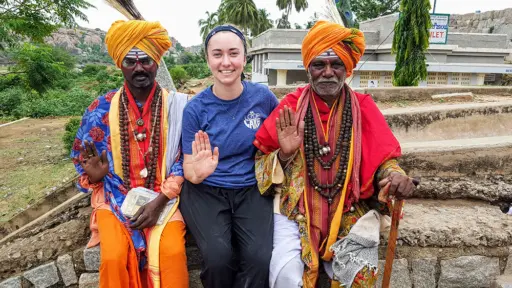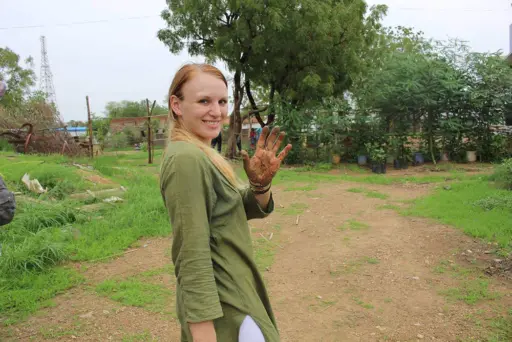To understand why Kayla Huemer and Hannah Lider are such close friends, you need to look to the country in which the two recent University of Wisconsin-Madison biomedical engineering graduates will live and work as 2018-19 Fulbright Scholars.
In India, there’s a term—jugaad—that cuts across a few of the country’s 22 officially recognized languages and is essentially equivalent to a “MacGyvered” solution: creating an innovative fix despite a lack of resources.
“There’s a certain pride in the spirit of jugaad that makes it fundamental to understanding Indian culture,” Huemer says.
 Kayla Huemer
Kayla Huemer
“It’s such a staple in the way both of us think,” adds Lider, who’s spent two previous summers in India and has become an advanced speaker of Hindi, the most prevalent language in the country. “Sometimes you’ve just got to make it work the best you can with what you have.”
It’s this type of innovative mentality that helped the pair flourish in the UW-Madison biomedical engineering undergraduate program, and it should serve them well as they take up their Fulbright research projects on opposite ends of India.
While more than 1,900 students from around the United States, including 19 from UW-Madison, will participate in the prestigious Fulbright U.S. Student Program during the 2018-19 academic year, Huemer and Lider are relative rarities as Badger engineers.
There have only been six previous College of Engineering graduates who have earned spots in the Department of State-sponsored program, which dates to 1946 and funds study, research or English teaching in foreign countries for an academic year.
“It’s so special,” says Lider. “This is exactly what I want to do, and I recognize that’s rare for people immediately after they graduate. I’m getting to apply skills I’ve developed in very different disciplines. And the fact that I’m sharing this experience with my best friend is unreal.”
 Hannah Lider
Hannah Lider
That friendship started in the Department of Biomedical Engineering’s undergraduate design curriculum. Huemer and Lider bonded while working on a digital biofeedback belt to teach abdominal breathing, a venture that won the design curriculum’s Design Excellence Award in 2016 and its top honor, the Tong Biomedical Design Award, in 2017.
Along the way, the pair also developed a mutual interest in India. As a first-generation college student paying for her own education, Lider had more or less ruled out studying abroad. But after hearing about the S.N. Bose Scholars Program, which sends American students to India to work in scientific research labs for a summer, she applied—despite admittedly knowing very little about the country.
Her experience sparked her interest in engineering for low-resource settings and spurred her to dive deep into Hindi classes through UW-Madison’s Center for South Asia after returning stateside. It also prompted her to encourage Huemer to try the Bose Scholars Program.
Huemer did, and while working at the Indian Institute of Science in Bengaluru, she uncovered the project she’ll continue to work on through her Fulbright grant: a wearable device to measure pressure points in the feet of diabetic patients.
Diabetes can cause nerve death in the extremities, inducing an unbalanced gate that creates acute pressure on parts of patients’ feet and leads to ulcers. Without proper treatment, the ulcers can become infected and eventually necessitate amputations; indeed, foot ulcers are a major cause of non-traumatic amputations worldwide. Considering 75 percent of global diabetic patients live in low- or middle-income countries, as estimated by a 2017 study in Diabetes Research and Clinical Practice, creating an affordable tool is crucial.
“Ever since I was little, I wanted to be a doctor who works in the jungles of the Amazon,” says Huemer, whose father came to Madison from Austria on a Fulbright, met her mother and settled in the U.S. “I was always interested in medicine, but until I came to UW-Madison, I didn’t know what an engineer was. And now, I feel so fortunate that Fulbright will allow me to combine my interest in low-resource healthcare with the biomedical engineering skills I’ve developed at UW-Madison.”
Lider is also revisiting an old connection in India. While studying Hindi on a Critical Language Scholarship in 2016, she visited Barefoot College, an organization that spreads self-sufficiency and sustainability to impoverished rural communities.
“I loved that visit,” she says. “Their mission stuck with me.”
So when she pursued the Fulbright, she knew she wanted to work with Barefoot College. After spending three months further studying Hindi through a Fulbright Critical Language Enhancement Award, she’ll split her time between two projects with Barefoot’s traveling women’s health clinic: one devising a more accurate and efficient test for measuring hemoglobin to screen for anemia in pregnant women; the other helping to digitize the clinic’s records, which cover 40 villages.
UW-Madison Fulbright Program advisor Mark Lilleleht says the program has made drawing more applicants from STEM fields a priority in recent years.
“Considering the strength of our academic programs and student body here, UW-Madison is very well-positioned to help more of our STEM students and graduates pursue and secure opportunities to continue their work abroad,” he says.
After Huemer and Lider spoke at the biomedical engineering department’s annual awards ceremony in May 2018, a few faculty members relayed comments from younger students about seeing Fulbright as a viable—and attainable—path.
“It was a very full-circle moment as I looked out at those students whose seats I was sitting in not even a year prior,” Huemer says. “I spoke to the idea of not losing your personality when it comes to where you take your engineering degree and what you do with the skills you’ve developed at this university. It was very humbling to have students and professors alike interested in hearing the story of where we’re going next.”